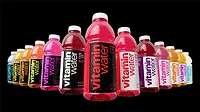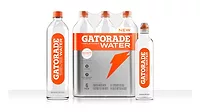2024 State of the Beverage Industry: Juice appeals to consumers for both wellness, enjoyment
Juice manufacturers deliver on sugar reduction, zero sugar trends

Image courtesy of Ocean Spray Cranberries Inc.
As consumers are more conscious about the food and beverages they consume, juice manufacturers are taking a proactive approach to develop products that satisfy taste and health and wellness goals.
A February 2023 report titled “Juice Production in the US” from IBISWorld, New York, spotlighted this shift, which was that consumers are noting products associated with a high sugar content. To match this shift, juice manufacturers have developed products to satisfy taste along with health and wellness goals.
“Health trends have hampered demand for juice,” the report states. “Health-conscious consumers are concerned about the high sugar content of juice. Juice producers have looked to new products to attract consumers. Large companies have introduced new juice varieties and purchased smaller competitors to gain access to niche product segments.”
Tropicana, a brand of PAI Partners and PepsiCo, acknowledged this trend with the relaunch of its Trop50 offering as Tropicana Light.
Delivering 100% of the recommended daily dose of vitamin C and a good source of potassium, Tropicana Light, contains 50% less sugar than regular orange juice, the company noted at the time of the launch. The juice is available in four varieties: Tropicana Light No Pulp, Tropicana Light Some Pulp, Tropicana Light No Pulp Calcium + Vitamin D, and Tropicana Light Vitamin C + Zinc.
Top refrigerated orange juices (Individual brands)
Source: Circana OmniMarket Total US - Multi Outlet w/ C-Store (Grocery, Drug, Mass Market, Convenience, Military and Select Club & Dollar Retailers) in the 52 weeks ending 5-19-24.
Recent data from Circana, Chicago, for the 52 weeks ending May 19, shows that the refrigerated orange juice market saw sales of $3.2 billion, down 4.4% from that time last year. The top brands in the category were as follows: Tropicana, Simply, private label, Florida’s Natural and Minute Maid.
All brands except Tropicana saw a decrease in dollar sales, which was up just 2.1% from the same 52-week period last year. The overall refrigerated orange juice market sales were down 4.4%.
Other beverage-makers opted to take health consciousness to the next level with zero sugar entrants into the juice category.
One such company was Boston-based Ocean Spray Cranberries Inc., which released Ocean Spray Zero Sugar Juice Drink — the first beverage from the company with bold flavor, zero grams of sugar and no artificial sweeteners.
Ocean Spray Zero Sugar Juice Drink contains stevia leaf extract that has been further processed and is available in two flavors: Cranberry and Mixed Berry. At the time of the release, Mixed Berry was a new flavor to the brand’s beverage portfolio.
“From full flavor blends to refreshing diet and now bold zero sugar, Ocean Spray is committed to developing product innovations that continually meet the needs and desires of consumers who are seeking out more options for their juice drink,” said Trinh Le, vice president of next generation beverages and omnichannel marketing at Ocean Spray, in a statement. “We’re excited to be the first brand to introduce this new innovative product in the shelf stable aisle and continue our legacy of beverage innovation.”
Prior to the launch of Ocean Spray Zero Sugar, the company released a better-for-you (BFY) juice line, including Immunity Cranberry Acai, Immunity Orange Mango, and Ocean Spray Revitalize Cranberry Pineapple Juice Drink.
Despite juice manufacturers addressing health and wellness concerns, analysts noted in Beverage Industry’s December 2023 issue that impacts on the juice category have been minimal.
Roger Dilworth, senior analyst at Beverage Marketing Corporation (BMC), Wintersville, Ohio, said that beverage-makers are still searching for what formulation will resonate with consumers.
“[Sugar reduction trends] haven’t taken full hold yet, as 50% orange juice blends have faded in the marketplace,” he shared. “Similarly, reduced sugar hasn’t pushed the needle in fruit drinks either. Marketers continue to try to crack the code, as with Ocean Spray’s newly announced Ocean Spray Zero Sugar Juice Drink.”
Top shelf-stable bottled fruit drinks
Source: Circana OmniMarket Total US - Multi Outlet w/ C-Store (Grocery, Drug, Mass Market, Convenience, Military and Select Club & Dollar Retailers) in the 52 weeks ending 5-19-24.
Circana’s data for the 52 weeks ending May 19 show that the Top 5 shelf-stable bottled fruit drinks were Snapple, Hawaiian Punch, Bai, Sunny Delight and Arizona, respectively. The shelf-stable bottled fruit drinks category saw sales of $2.7 billion.
Of the top brands in the segment, Sunny Delight’s sales grew the most at 18.2%. The company’s sales reached $171 million in those 52 weeks.
Despite sugar content being on the minds of consumers, research shows that juice appeals to wellness and pleasure motivations. In a 2023 report from Chicago-based Mintel titled “Juice and Juice Drinks – US,” the market research firm showcased that dual associations exist for the category.
“Forty-eight percent of those who say they consumed more juice as a treat also say they have consumed more juice for health reasons, and 43% of those who have consumed more juice for health reasons say they have also consumed more as a treat,” the report states.
In terms of sweetener preferences, Mintel’s research found that consumers’ familiarity with sweetener carries more weight than its wellness attributes, as shoppers look to avoid overthinking purchases.
“White sugar’s netted ranking over naturally non-nutritive monk fruit and allulose further suggests this thinking pattern; meanwhile, honey’s perceptions as a ‘whole’ may afford it even more acceptance and remind brands of the importance of flavor experience within juice and juice drinks,” the report states.

In its survey of 1,397 internet users aged 18 and older who purchased juice or juice drinks in the past three months (February 2023), “honey,” “no added sweeteners” and “white sugar” comprised the Top 3 preferred sweeteners.
Aside from consumer preference, another factor has impacted the juice market: inflation.
“Fruit beverage volume is estimated to be down in the 3% range for 2023, based on preliminary data, with revenues up by a similar amount due to inflation,” BMC’s Dilworth explained in Beverage Industry’s December 2023 issue. “Juice drinks have been performing nominally better than juice.”
Dilworth added that the rise in prices has caused a shift in consumer purchase patterns.
“… [T]he higher price points have influenced some shoppers to trade down from chilled to shelf-stable, while news of the spiking price of orange juice futures have even reached the mainstream financial press,” he noted.
Beyond traditional juice and juice drink segments, inflation also has impacted premium segments, such as cold-pressed/high-pressure processed (HPP) juices.
“There is a niche consumer who buys these products, but their high price points, especially continuing into the near term, will present challenges particularly if a recession should finally hit in 2024,” Dilworth said.
Despite such challenges, Dilworth shared that, as consumers see a deceleration of inflation within juice, it could help the category stave off volume attrition.
“If inflationary pressures continue to subside, volume may improve — barring a recession — but will likely still be flat to slightly negative,” he explained. “On the flip side, revenue growth may decelerate to the 0 to 1% range.”
Still, Mintel’s research shows that consumers continue to view juice and juice drinks as an accessible avenue to consume necessary nutrients.
“Even as inflation watered down juice and juice drink category performance in 2022, its blanket presence on all food and drink products positioned juice and juice drinks as an affordable nutrition and enjoyment,” Mintel’s report states. “More consumers increased juice consumption over the last six months for either health or enjoyment than decreased due to prices … and 63% say that juice can be as cost-effective way to add nutrients in place of produce.”
As consumers still value the way juice and juice drinks deliver nutrients, there is potential for emerging entrants.
“There is some innovation in the juice segment, which is generally classified in the no-alcohol shot category (rather than fruit beverages), as marketers fortify them with probiotics and herbs targeting immune support, digestion and even energy via caffeine,” BMC’s Dilworth explained in Beverage Industry’s December 2023 issue.
IBISWorld’s report denoted that a niche of health-conscious consumers are turning to vegetable juices that often are combined with fruit juices to sweeten the taste.
“The high level of nutrients and antioxidants present in vegetable juices has led to greater consumer interest alongside rising health consciousness, enabling this segment to secure a strong and growing niche,” the report states.
As for innovation, Mintel’s report signals the importance of enhancing flavor and nutrition in juice, but that manufacturers should not try to change the identity of the juice category.
“Classic flavors and functionality will always have a crowd; presenting these with a twist can make the core base do a double take,” it states. “Add flavor dimension and connect ingredients to functionality to gently flip the script while remaining true to juice’s dual draws of wellness and enjoyment.”
Looking for a reprint of this article?
From high-res PDFs to custom plaques, order your copy today!






